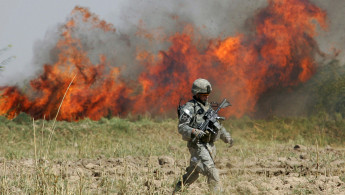Iraq: from breadbasket to basket case
Iraq was once known as ard al-sawad, or the black land, thanks to its rich dark soil palm groves so lush that the landscape looked black from a distance.
However, after multiple wars, the country can no longer boast of being the oasis among the featureless deserts of its neighbours.
In 1970, Iraq produced 75 percent of its grain needs and more than 90 percent of its demand for fruit, vegetables, meat and eggs. However, since the US invasion of 2003, the country's agricultural sector provides less than 30 percent of its needs. The remainder is imported from neighbours including Turkey, Jordan, Iran and Syria.
Desertification has also slowly eaten away at Iraq's arable land in this time, causing farmers to abandon their fields.
The undersecretary of the ministry of agriculture, Mehdi Damad al-Qayssei, told al-Araby al-Jadeed that there are other concerns for farmers.
"The terrorist gangs have taken control of the most important agricultural areas in Iraq, such as Nineveh, Diyala, Salaheddin, Kirkuk and Anbar, which has lost Iraq a considerable amount of its agricultural produce," he said.
"After the security operations in those governorates a large part of those crops were lost."
| Baghdad defence minister plays down Iranian commander's role in Iraq: "I've never seen him". |
Qayssei says that grain production in Nineveh, which used to supply Iraq with half its wheat and barley, has been cut in half since the arrival of the Islamic State group.
It is worse in areas witnessing heavy fighting, with reports of a 55 percent decrease in crops - an alarming trend that threatens Iraq's food security.
According to experts, about 60 percent of fields in the governorate of Diyala have been destroyed due to military operations in the area.
The IS group is also in control of a large part of Iraq's livestock, which grazes on the plains of Niveneh and Anbar.
Iraq is also reliant on Sallaheddin and Diyala governorates, plus areas surrounding the capital Baghdad, for fruit, with these areas producing 30 percent of market demand.
However, military operations have also had a devastating effect on fruit production, according to Qayssei.
| In 1970, Iraq produced 75 percent of its grain needs. Since the US invasion of 2003, it provides less than 30 percent. |
It has forced the government to look for alternatives to ensure Iraq is fed. Qayssei pledged that the ministry would continue to provide farmers with loans despite an expected $20bn national deficit in 2015.
Ahmed al-Zubaidi, an agricultural expert, said he believed the the farming sector would face problems even after the defeat of the IS group.
Zubaidi added that areas such as Nineveh were in dire need of funding and warned that the farms could be completely destroyed due to the military operations.
This article is an edited translation from our Arabic edition.





 Follow the Middle East's top stories in English at The New Arab on Google News
Follow the Middle East's top stories in English at The New Arab on Google News


